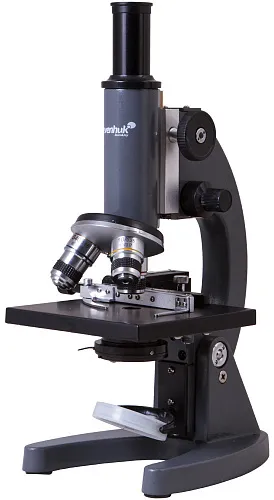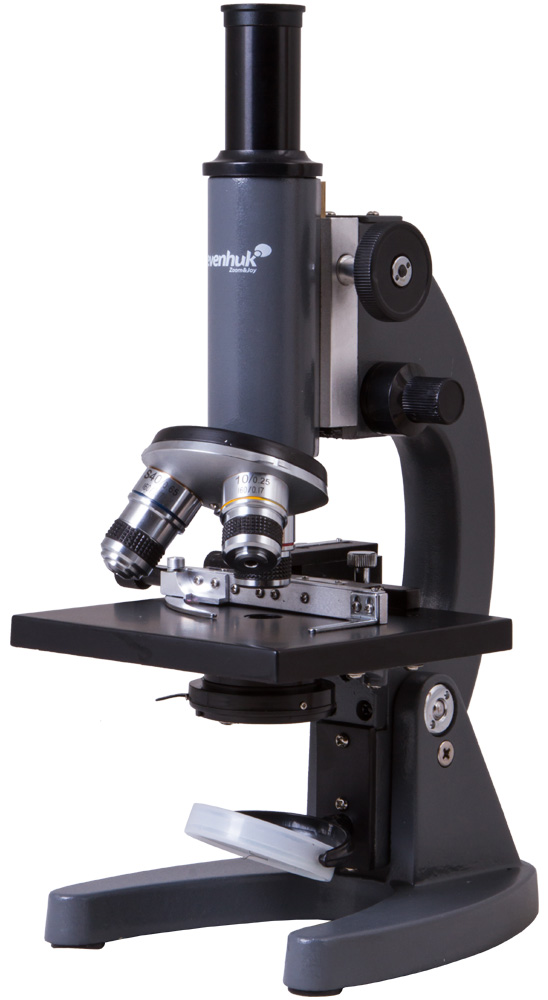Levenhuk 7S NG Monocular Microscope
Magnification: 40–800х. Abbe condenser, an iris diaphragm and light filters
| Product ID | 71917 |
| Brand | Levenhuk, Inc., USA |
| Warranty | lifetime |
| EAN | 5905555004280 |
| Package size (LxWxH) | 9.8x7.9x14.2 cm |
| Shipping Weight | 6.6 kg |
Levenhuk 7S NG Microscope is designed especially for school children and kids interested in science. A reliable and easy-to-operate optical tool allows for exploring the micro world at 800x magnification. This magnification is sufficient for performing entertaining biological experiments, observing one-celled organisms, and detailed studying of the prepared microscope slides.
The microscope contains a classical illumination system that consists of an Abbe condenser, an iris diaphragm and light filters. The illuminator is a mirror placed under the stage. This design does not require AC supply, and that makes the optical tool safer, especially for children.
The optical scheme of Levenhuk 7S NG consists of a triple-cavity revolving nosepiece, installed objective lenses with different magnification and two eyepieces. The last ones are installed in the eyepiece tube and allow for adjusting the magnification and field of view of the microscope. The microscope slides are placed on the stage. It is equipped with a mechanical scale that allows for moving the microscope slides along two axes – X-axis (left-right) and Y-axis (forwards-backwards). The fine and coarse focusing knobs are used for sharpness adjustment.
The microscope body is made of metal. It is sturdy, reliable and durable.
Features:
- Microscope for studies and hobby
- Sturdy metal body
- Simple and durable design
- All-glass optics
- Revolving nosepiece for three objective lenses
- Abbe condenser with an iris diaphragm
- Three light filters (blue, green, yellow)
- Mechanical stage
- Mirror illumination that does not require AC supply
The kit includes:
- Microscope
- Objective lenses: 4x, 10x, 40x
- Eyepieces: 10x, 20x
- User manual and lifetime warranty
Levenhuk 7S NG Microscope is compatible with Levenhuk digital cameras (purchased separately). Levenhuk cameras are installed in the eyepiece tube instead of an eyepiece.
| Product ID | 71917 |
| Brand | Levenhuk, Inc., USA |
| Warranty | lifetime |
| EAN | 5905555004280 |
| Package size (LxWxH) | 9.8x7.9x14.2 cm |
| Shipping Weight | 6.6 kg |
| Type | biological, light/optical |
| Head | monocular |
| Optics material | optical glass |
| Nozzle | fixed (non-rotatable) |
| Head inclination angle | not angled |
| Magnification, x | 40 — 800 |
| Eyepiece tube diameter, in | 0.9 |
| Eyepieces | 10x, 20x |
| Objectives | 4x, 10x, 40xs (spring) |
| Revolving nosepiece | for 3 objectives |
| Stage, mm | 120x120 |
| Stage moving range, mm | fixed |
| Stage features | with a mechanical stage |
| Condenser | Abbe N.A. 0.65 |
| Diaphragm | iris |
| Focus | coarse (50mm) and fine (1.8–2.2mm) |
| Body | metal |
| Illumination | mirror |
| Light filters | blue, green, yellow |
| User level | beginners |
| Assembly and installation difficulty level | easy |
| Application | school/educational |
| Illumination location | lower |
| Research method | bright field |

 BG
BG  BY
BY  CY
CY  CZ
CZ  DE
DE  EE
EE  ES
ES  EU
EU  GR
GR  HU
HU  IS
IS  IT
IT  LT
LT  LV
LV  MY
MY  PL
PL  PT
PT  RO
RO  SK
SK  TR
TR  UA
UA 
















